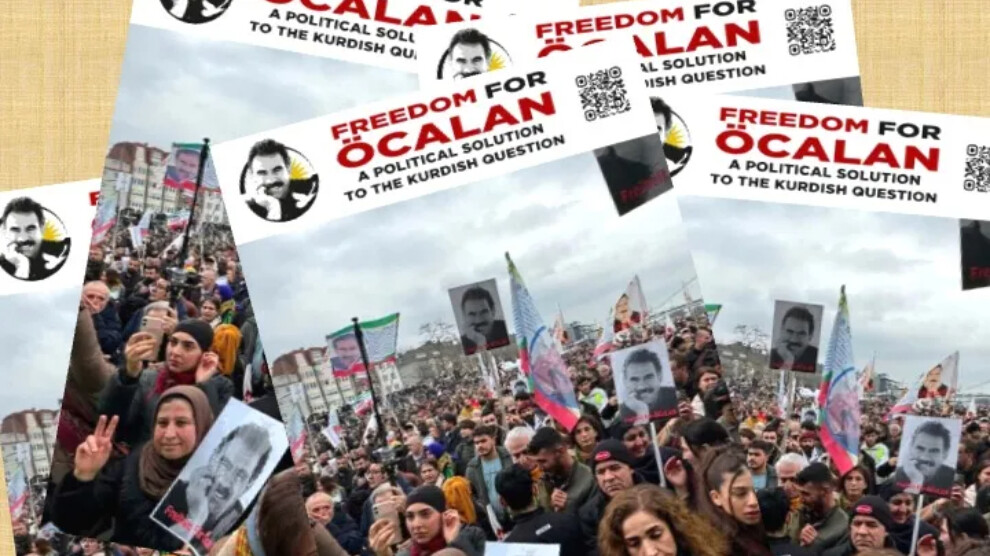New dossier records 8 months of actions for Öcalan
The global campaign ‘Freedom for Öcalan: A Political Solution for the Kurdish Question’ has now been active for eight months.
The global campaign ‘Freedom for Öcalan: A Political Solution for the Kurdish Question’ has now been active for eight months.

The global campaign ‘Freedom for Öcalan: A Political Solution for the Kurdish Question’ has now been active for eight months. The new campaign dossier includes a summary of actions to date, alongside vital information on Abdullah Öcalan’s life and philosophy, and the present situation on İmralı Island Prison. We reproduce material on actions below, and you can download the complete brochure here.
This new campaign was launched on 10 October – the day after the 25th anniversary of Abdullah Öcalan’s expulsion from Syria that ended with his abduction by an international plot and imprisonment in Turkey. International supporters carried out 74 actions – one for each year of Öcalan’s life – in 31 different countries. (At least that was the plan, but more events kept being added…)
Argentina, Australia (2 locations), Austria 2 locations), Bangladesh, Belgium (European Parliament Brussels and 2 other locations), Brazil, Colombia (2 locations), Cyprus, Denmark, East Timor, Ecuador, England (2 locations), Eswatini, France (Strasbourg 2 and 6 other locations), Germany (11 locations), Greece (2 locations), India, Ireland, Italy (15 locations), Kenya (2 locations), Myanmar, the Netherlands, Nigeria, Norway, the Philippines, Scotland, Slovenia, South Africa, Spain/Basque Country/Catalonia (6 locations), Sweden, Switzerland (6 locations), and Wales.
Those taking part included politicians, trade unionists, and activists, many of whom see links between Öcalan and the Kurdish Movement and their own struggles. The first message received came from women of the Bangladesh Garment Workers’ Union, and there was strong support from other subjugated nations, such as the Basques. Among the many demonstrations and oral statements, were some more visual messages – a giant image of Öcalan in Munich, a street performance in Berlin, and a mock-up of Öcalan’s prison cell in Lubjiana. The French authorities prevented the central event outside the Council of Europe in Strasbourg with a last-minute ban, but the parliamentary speakers gave their speeches inside the Council building instead.
These international actions were followed by over thirty demonstrations in different parts of Kurdistan, and more in the Kurdish diaspora, and by statements of support from Kurdish organisations everywhere. In Kurdistan, supporting groups have ranged from cultural and art organisations in North and East Syria, to Arab youth in Şengal. The call for Öcalan’s freedom made in Amed (Diyarbakir) was supported by 172 different organisations.
On 24 October, street stalls were held in many European cities, and on the weekend of 11-12 November marches were organised by Kurdish youth movements in Europe and Canada.
In dozens of cities, events were held on the 10th of December 2023 for Öcalan Book Day.
Demonstrations, press conferences, and panel discussions in support of the campaign have been held across Europe, South America, Africa, the Middle East and South Asia. Alongside many smaller meetings, and further statements from groups and individuals, there have been discussions and support statements at the International Women’s Forum in Düsseldorf; at the World Youth Conference in Paris – attended by representatives of over sixty organisations; at the Dialogue Forum in Raqqa – attended by 250 women; and at the international Art and Freedom Conference organised in Basel by the Academy for Democratic Modernity. There has been a conference at the University of Rome, and a press conference at the Italian parliament, and Öcalan’s situation was raised in the Parliament of New South Wales. Spain’s Aragon Parliament hosted discussions on Kurdish rights, Öcalan’s isolation in May of 2024. Support from artists included an installation in Paris with a prison cell for each year of Öcalan’s incarceration.
On the 15th of February, tens of thousands of people from across Europe gathered in Cologne for a demonstration to mark the 25th anniversary of the handing over of Abdullah Öcalan to Turkey on 15 February 1999. Thousands of postcards have been sent to İmralı Island prison.
A conference was held in the European Parliament in April 2024 titled ‘Political Prisoners: Isolation, ill-treatment and torture’ conference, which addressed the detention conditions of political prisoners in Turkey and Europe, focusing specifically on conditions in Imrali.
Following this conference, dozens of letters from European civil society – including activists, unions, academics and lawyers – and also politicians, were sent to the Committee for the Prevention of Torture (CPT), demanding that Öcalan’s lawyers and family be allowed to visit him. This initiative was paired with demonstrations and a press conference outside the CPT, and was successful in both eliciting a response from the CPT, and in brining international attention to the struggle for the freedom of Abdullah Öcalan.
This June, events across Europe titled ‘Dialogue with Öcalan – you can’t imprison ideas!’ have been organised, to address Öcalan’s ongoing isolation and foster public discourse around his concepts and writings.